Does your resume grab the attention and hit home with employers? Does it generate responses? A resume is not just a history of your career, a listing of jobs you held and the tasks you performed. It’s a future-oriented marketing piece positioning you as the most qualified candidate for a position. To do that, the content must be based on the position you are seeking, not just the ones you held. The content needs to be meaningful and relevant to the employer. It must demonstrate initiative, problem-solving, and value to previous employers.
Know what’s important to the employer. Begin with a strongly focused introduction. Concisely summarize responsibilities and focus on your accomplishments. Be very strategic; paint the right picture with your words. Use formatting to enhance readability and drive your message home. Write tight; trim and polish at least three times. Take these 10 tips to heart when preparing your resume.
- Get into the right mindset. Overcome procrastination and don’t lose sight of the real goal. It may seem like your goal is to write your resume, but your real goal is to capture the employer’s attention and land a job.
- Start fresh. Get rid of old resume baggage. Keep your eye on the job you are seeking. Approach your resume with today’s perspective.
- Assume the employer’s perspective. It’s not the story you want to tell, but the story the employer wants to hear. Demonstrate you can solve problems, save money, and make money.
- Don’t tell me, sell me! Job hunting is a sales job. Your resume is a sales tool, marketing brochure, and calling card. In sales features attract, but benefits sell. Load your resume with benefits. Articulate your value, previous contributions, and successes.
- Use industry keywords liberally and appropriately. Don’t just dump them in the resume, use them in context throughout the resume.
- Capture attention with a combination style that includes an introduction, career history, short job descriptions, bulleted accomplishments, education/professional development, specialized training, credentials, and certifications as well as affiliations, memberships, and community involvement.
- Distinguish responsibilities from accomplishments. Responsibilities are the tasks they hired you to do; anyone with your same title has the same responsibilities. Accomplishments tell us how well you performed those tasks and how valuable you were to your employer. Accomplishments are unique to you. They differentiate you from other candidates.
Avoid weak responsibilities; they do more harm than good. Ineffective resumes include long laundry lists of bulleted responsibilities. They tend to be passive, uninspiring, and make you look like every other candidate. (i.e., troubleshoot networking components, install, configure, and maintain computer equipment). Do not just repeat your job description.
Use strong responsibilities that paint a robust picture of what you did. (i.e., Service Manager. Managed a 7-member team repairing an average of 390 warranty and non-warranty repair orders per month.)
- Make accomplishments strong. Maximize the most powerful content on your resume. Quantify or explain the impact of your work on the organization. Frame your results with context. State how you improved or streamlined something, mentored someone, avoided a crisis, helped a customer, increased productivity, saved money, and so on. (i.e., Consistently beat annual profit target of $1.5M by at least 2X. Delivered 20% of company’s total 2015 revenue with 15% profit margin.)
- Avoid standard templates that make you look like every other candidate and follow good resume writing practices. Be generous with white space; select a common font; vary sentence structure and employ parallel construction; use emphasis sparingly; be consistent in capitalization, punctuation, spelling, type, and line spacing.
- Edit, proof, and polish at least twice, then walk away and look it over with fresh eyes in a day or so.

